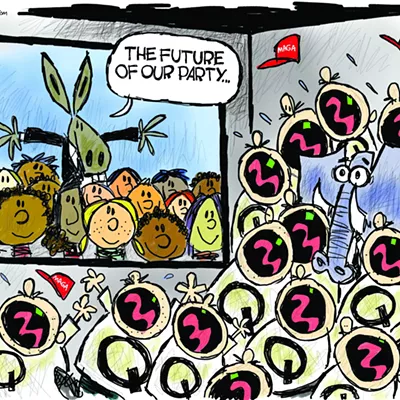Secretary of State
LIBERTARIAN SEAN Nottingham wants people to vote for him because he's not a Democrat nor Republican."The office is about elections," he says, so members of the two major parties "should not have the final say about them, or control them. I offer an objective alternative."
Democrat Chris Cummiskey and Republican Jan Brewer obviously disagree. They both cite their extensive political experience as one reason people should support them.
While all three candidates favor the adoption of a statewide "no-call" list for telemarketers, including politicians, they differ in their approaches. Cummiskey has little hope the state legislature, which failed this year to adopt such a measure, will do it in 2003. Instead, he talks of having to use a citizen initiative to get the job done. Plus, he charges Brewer has, "flip-flopped on the issue more times than pancakes on a Sunday griddle."
Brewer says her opponent is spinning stories about her position on the "no-call" list. She favors it, but wants to be very careful about interrupting people's freedom of speech and violating the federal interstate commerce clause.
All three candidates also endorse implementing optical scan voting equipment statewide. However, they disagree on how the $3.4 million needed to get that done will be raised in cash-strapped Arizona. Both Brewer and Cummiskey would look to the federal government and private foundations for the revenue, but Nottingham has a different idea. He wants to use money not spent by the "Clean Elections" campaign fund and combine it with a fee of $20 to $30 charged to those who want to be on the "no-call" telemarketer list to pay for the voting equipment.
State Treasurer
BULL AND BEARISH projections for the future course of the stock market couldn't be any more diverse than the positions taken by the two candidates for this office. Republican David Petersen criticizes both his general election opponent and the current Republican-run office, Democrat Ruth Solomon from Tucson believes current Treasurer Carol Springer "has done a fine job."In these shaky economic times, Petersen wants to change how the state invests its money. He thinks no more than 40 percent of the almost $1 billion endowment fund should be in equities and wants to hire a high-priced money manager to oversee the fund.
Petersen says he will reduce the 30-person Treasurer's office by 13 or 14 positions and claims Solomon has switched sides on the state's investment strategy since starting her campaign. He also points with pride to his endorsement by Arthur Laffer, economic advisor to President Ronald Reagan.
Solomon replies that she never supported changing the investment strategy, but thinks the current 60 percent in equities, which is the legal limit, is a little high. She also opposes trimming the staff. "The office employees will stay with me," she says.
Solomon offers a multi-point plan for protecting Arizona's investments. She wants the state to avoid buying stocks in certain companies, including those that avoid U.S. taxes by relocating off-shore of the United States. She favors investing up to 2 percent of the fund as seed capitol to grow Arizona companies.
Both candidates think this little-known position should remain an elected one, but the office-holder must be more out-spoken. Petersen says he would get involved with Legislative budget issues, while Solomon promises to take a more active role in managing governmental debt and improving Arizona's economy.
Corporation Commission Four-Year Term
BEFORE INCUMBENT JIM Irvin faces challenger James Walsh on November 5, he first has to deal with legal proceedings about his actions while in office. Accused of improperly using his influence to affect the proposed but failed merger of Southwest Gas Corporation with Oneok, Inc. two years ago, Irvin is being sued by a rival competitor for the gas company.Democrat Walsh believes these charges are a major issue in the race, calling them "pretty serious stuff." He says he would bring integrity to the commission and that Arizona has to have honest people setting utility rates.
Irvin counters that he has the experience, knowledge and proven record of protecting consumers from unfair rate increases. He cites the upcoming small decrease in Tucson Electric Power Company charges as one example of his success.
Irvin also points to the Commission's order to Qwest to invest $800 million in infrastructure as an accomplishment. But Walsh blames him in part for the problems which have resulted with the telephone company. "Someone has to be accountable in public life," he says. "My opponent has been there six years and the Commission should have been on top [of the problems]."
The two also differ on their views toward electrical deregulation at the household level. Walsh asks, "If it isn't going to lower costs and maintain the current quality-of-service, why are we involved with it?"
Irvin admits that at first he was a vocal proponent of the idea, but he's now backpeddling. "It has to show benefits to consumers and the state, which it hasn't done," he says. "We need to slow the process [moving toward household deregulation] down. I don't see it happening because there are no benefits."
As far as Arizona possibly becoming a "power farm" for other states and northern Mexico, Irvin believes these proposed new power plants will actually be economic engines. If they have the support of local communities and exceed environmental standards for clean air, Irvin thinks these projects are a "win-win" for the state.
Walsh agrees the state needs an adequate power supply. But he says these plants would sell most of the electricity they generate to out-of-state consumers. "There are impacts on air and water quality," Walsh says. "They also increase the siting of transmission lines, which aren't pretty."
Corporation Commission Two-Year Term (Two Seats)
WHAT THE COMMISSION could and should have done to prevent consumer problems with Qwest separate these four candidates along party lines. They also differ on Arizona's future as an electrical "power farm."Republicans Mike Gleason and Jeff Hatch-Miller take a more conciliatory view of the role the Commission played with Qwest. Gleason believes there was very little it could have done to prevent the telephone fiasco. "Those problems originated in Denver [the company's corporate headquarters] where bad decisions were made. The Commission had no control over it."
While Hatch-Miller agrees the elected officials couldn't have foreseen the problems which occurred, he does advocate some changes based on the experience. For one, he believes Commission decisions should be made more quickly. He also thinks they must demand that promises made by the company concerning customer service and infrastructure improvements in rural areas are kept.
Democrats George Cunningham and Roland James take a more aggressive stand about what the Commission could have been done about Qwest. "They should have been very careful about the takeover [from U S West] and set performance standards on the transfer and looked at the debt of the company," James says. "If the performance standards weren't met, then Qwest should have been hauled in and fined." Tucsonan Cunningham agrees, pointing out it was Attorney General Janet Napolitano who acted to address Qwest problems, not the Corporation Commission.
The two Democrats also take a more cautious view of the proposal to build power plants in Arizona which would ship most of their electricity outside the state. Cunningham says that environmental standards for these plants should be ratcheted up and that he isn't interested in power farm projects if the price is the degradation of the state's environment.
James adds that power companies are looking to build in Arizona because of electrical deregulation and a tax break passed in 1999, a law he thinks should be repealed. "We should not use scarce water and clean air to be a power farm for out-of-state interests," he says.
Republican Gleason sees these plants as a reserve source of energy for the state. Hatch-Miller sees them as a product of the free market. "Local companies sell out-of-state sometimes now in a marketplace which delivers power from Vancouver to Mexico," Hatch-Miller says. "It's like growing watermelons. The company is producing a product to sell on the open market. Its a base industry [which will help the state's economy]. The plants are fine if they're environmentally benign and producing a needed product."
Of the four, only Gleason sees potential for electrical deregulation at the consumer level. He wants to take a go-slow approach to the concept, while both Hatch-Miller and Cunningham wonder why a change that won't produce benefits for the consumer should even be pursued. James goes even a little bit further, saying, "We should move away from [consumer level] electrical deregulation as quickly as possible."
State Superintendent of Public Instruction
LIBERTARIAN CANDIDATE JOHN Zajac hopes people support him as a protest vote against the two major parties. "The Democrat is backed by teachers unions and the Republican by conservative parents who want surveillance of their children, so voters should send a message there is a third alternative," he says.Believing that school children aren't learning that Lincoln freed the slaves, Zajac favors vouchers of $6,000 to $8,000 per student, school choice and privatization of the educational system as far as legally possible. "I have a tremendous belief that the free market will lead to [budget] efficiencies and better education," he says.
Republican Tom Horne argues that K-12 education in Arizona needs both more money and accountability from schools and students. Pointing to his 24 years of service on the Paradise Valley School Board, Horne says, "I demonstrated by focusing on discipline and academics that we could produce soaring test scores. I can do that statewide." Horne also favors a modified AIMS test and is pushing a state-mandated 5 percent cap on school district administrative costs to get more money into the classroom.
Democratic candidate Jay Blanchard says he doesn't believe the state should micro-manage school district budgets, but instead go after some of the $1.2 billion in federal educational money it has left untouched in Washington, D.C. He also wants to do away with the AIMS test. "The Governor's office says $15 million a day is spent on test preparation or testing and that is money which could be spent on instruction instead," says Blanchard. "We need more money for teachers and early childhood education, less spent on testing."
State Mine Inspector
FOR 14 YEARS, Republican Doug Martin has been Arizona's State Mine Inspector, an elected office that often doesn't even draw a Democratic candidate. But this year, the Democratic Party has found a challenger in Ken Hallock."Arizona miners think Doug Martin turns in whistle-blowers and doesn't do the job," says Hallock. "It is time to do something about job safety, not just do political posturing. Martin has only represented mining companies, and this election is a chance to make a change."
In response, Martin proudly claims Arizona is the safest mining state in the nation based on the lost-time accident rate. He also says the whistle-blower charge is false because if he did that, he could be removed from office.
According to Martin, mining today still employs 14,000 people in the state and accounts for $12.6 billion in annual revenue. To better protect the safety of miners, he favors making the inspector's job a nonpartisan elected position.
Both candidates agree that the job should not be an appointed one, however. "The office holder must be responsive to the public," Hallock says, believing an appointed official would be more isolated from the people he is suppose to serve.










